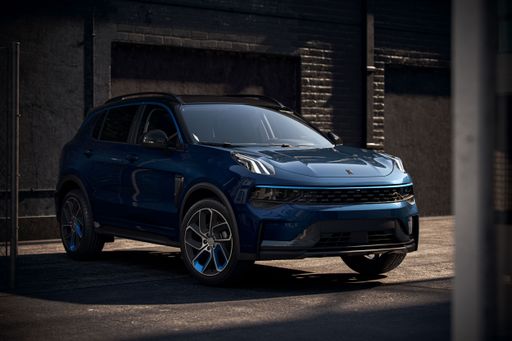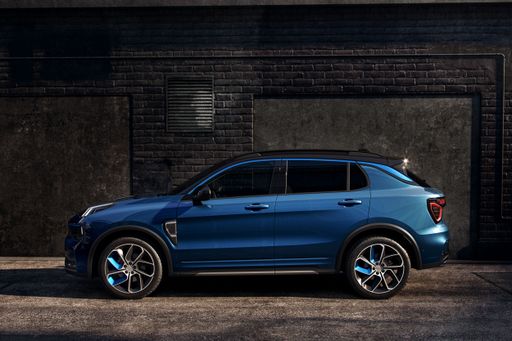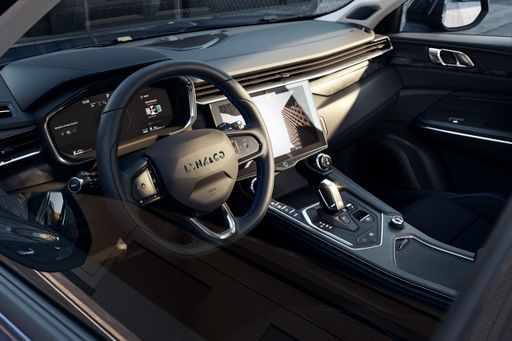VW Tiguan vs Lynk & Co 01 - Differences and prices compared
Compare performance (272 HP vs 280 HP), boot space and price (33300 £ vs 36900 £) at a glance. Find out which car is the better choice for you – VW Tiguan or Lynk & Co 01?
Costs and Efficiency:
Price and efficiency are often the first things buyers look at. Here it becomes clear which model has the long-term edge – whether at the pump, the plug, or in purchase price.
VW Tiguan has a slightly advantage in terms of price – it starts at 33300 £, while the Lynk & Co 01 costs 36900 £. That’s a price difference of around 3552 £.
Fuel consumption also shows a difference: Lynk & Co 01 manages with 0.90 L and is therefore convincingly more efficient than the VW Tiguan with 1.40 L. The difference is about 0.50 L per 100 km.
As for range, the VW Tiguan performs convincingly better – achieving up to 126 km, about 51 km more than the Lynk & Co 01.
Engine and Performance:
Power, torque and acceleration say a lot about how a car feels on the road. This is where you see which model delivers more driving dynamics.
When it comes to engine power, the Lynk & Co 01 has a slight edge – offering 280 HP compared to 272 HP. That’s roughly 8 HP more horsepower.
In acceleration from 0 to 100 km/h, the VW Tiguan is evident quicker – completing the sprint in 5.90 s, while the Lynk & Co 01 takes 7.70 s. That’s about 1.80 s faster.
There’s also a difference in torque: Lynk & Co 01 pulls clearly perceptible stronger with 535 Nm compared to 400 Nm. That’s about 135 Nm difference.
Space and Everyday Use:
Cabin size, boot volume and payload all play a role in everyday practicality. Here, comfort and flexibility make the difference.
Both vehicles offer seating for 5 people.
In curb weight, VW Tiguan is distinct lighter – 1599 kg compared to 1935 kg. The difference is around 336 kg.
In terms of boot space, the VW Tiguan offers evident more room – 652 L compared to 466 L. That’s a difference of about 186 L.
When it comes to payload, VW Tiguan distinct takes the win – 533 kg compared to 415 kg. That’s a difference of about 118 kg.
Who comes out on top?
Overall, the VW Tiguan shows itself to be wins by a narrow margin and secures the title of DriveDuel Champion.
It convinces with the more balanced overall package and proves to be the more versatile choice for everyday use.

VW Tiguan
Costs and Consumption
View detailed analysis
Engine and Performance
View detailed analysis
Dimensions and Body
View detailed analysis
VW Tiguan
The VW Tiguan blends sensible family practicality with a dash of German polish, delivering a calm, reassuring ride and a cabin that never feels like an afterthought. For buyers who want an SUV that’s easy to live with yet still nicely dressed, the Tiguan is the grown‑up choice that keeps a cheeky wink in reserve.
details





Lynk & Co 01
The Lynk & Co 01 marries bold, contemporary styling with a roomy, well-appointed cabin, striking a rare balance between fashionable flair and everyday practicality. With intuitive tech, flexible ownership ideas and a playful driving character, it’s the kind of crossover that turns heads at the lights and keeps owners grinning on the commute.
details



|

|
|
|
|
Costs and Consumption |
|
|---|---|
|
Price
33300 - 51900 £
|
Price
36900 - 40300 £
|
|
Consumption L/100km
1.4 - 8.4 L
|
Consumption L/100km
0.90 L
|
|
Consumption kWh/100km
-
|
Consumption kWh/100km
-
|
|
Electric Range
118 - 126 km
|
Electric Range
75 km
|
|
Battery Capacity
19.70 kWh
|
Battery Capacity
-
|
|
co2
32 - 190 g/km
|
co2
20 g/km
|
|
Fuel tank capacity
45 - 58 L
|
Fuel tank capacity
-
|
Dimensions and Body |
|
|---|---|
|
Body Type
SUV
|
Body Type
SUV
|
|
Seats
5
|
Seats
5
|
|
Doors
5
|
Doors
-
|
|
Curb weight
1599 - 1890 kg
|
Curb weight
1935 kg
|
|
Trunk capacity
490 - 652 L
|
Trunk capacity
466 L
|
|
Length
4539 mm
|
Length
-
|
|
Width
1842 - 1859 mm
|
Width
1860 mm
|
|
Height
1656 - 1658 mm
|
Height
-
|
|
Max trunk capacity
1486 - 1650 L
|
Max trunk capacity
-
|
|
Payload
460 - 533 kg
|
Payload
415 kg
|
Engine and Performance |
|
|---|---|
|
Engine Type
Petrol, Petrol MHEV, Diesel, Plugin Hybrid
|
Engine Type
Plugin Hybrid
|
|
Transmission
Automatic
|
Transmission
Automatic
|
|
Transmission Detail
Dual-Clutch Automatic
|
Transmission Detail
Automatic Gearbox
|
|
Drive Type
All-Wheel Drive, Front-Wheel Drive
|
Drive Type
Front-Wheel Drive
|
|
Power HP
130 - 272 HP
|
Power HP
280 HP
|
|
Acceleration 0-100km/h
5.9 - 10.6 s
|
Acceleration 0-100km/h
7.70 s
|
|
Max Speed
210 - 242 km/h
|
Max Speed
-
|
|
Torque
220 - 400 Nm
|
Torque
535 Nm
|
|
Number of Cylinders
4
|
Number of Cylinders
4
|
|
Power kW
96 - 200 kW
|
Power kW
206 kW
|
|
Engine capacity
1498 - 1984 cm3
|
Engine capacity
1499 cm3
|
General |
|
|---|---|
|
Model Year
2024 - 2025
|
Model Year
2024
|
|
CO2 Efficiency Class
G, D, E, F, B
|
CO2 Efficiency Class
B
|
|
Brand
VW
|
Brand
Lynk & Co
|
What drivetrain options does the VW Tiguan have?
The VW Tiguan is offered with All-Wheel Drive or Front-Wheel Drive.
The prices and data displayed are estimates based on German list prices and may vary by country. This information is not legally binding.
